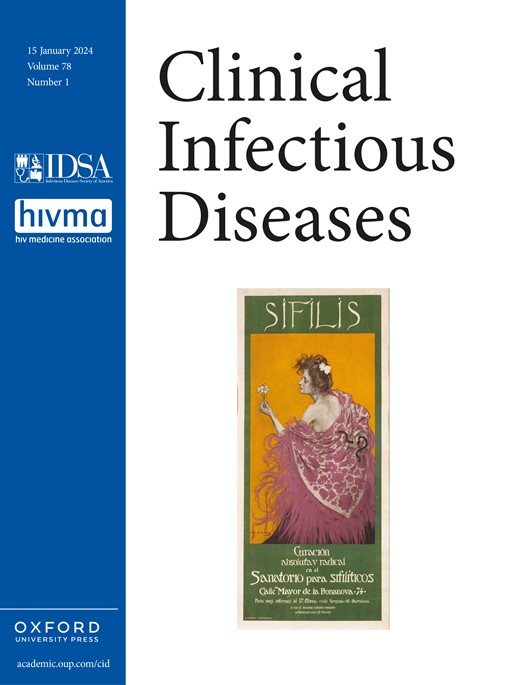Treatment Outcomes With an Oral Short Course Regimen for Rifampicin-resistant Tuberculosis in a High HIV Prevalence, Programmatic Setting in South Africa
IF 8.2
1区 医学
Q1 IMMUNOLOGY
引用次数: 0
Abstract
Background Bedaquiline-based oral short-course regimens (SCR) for rifampicin-resistant tuberculosis (RR-TB) are highly effective in clinical trials but outcomes in programmatic settings may be more modest. We evaluated clinical and bacteriological outcomes with a seven-drug, linezolid-containing SCR in a high-burden programmatic setting. Methods This prospective cohort study enrolled adults with newly diagnosed RR-TB who were started on the oral SCR in the Eastern Cape Province, South Africa. The primary outcome was World Health Organization-defined end-of-treatment success. Secondary outcomes were TB-free survival (composite of alive, absence of a positive Mycobacterium tuberculosis culture, and treatment completed or in care) at 18 months and time to sputum culture conversion (SCC). Results In total, 248 participants were included, 173 (69.8%) of whom were human immunodeficiency virus (HIV) positive. Culture conversion by 90 days was 96.8% (median time to SCC: 29 days, 95% confidence interval [CI]: 27–31). Treatment success was 37.5% (93/248). Reasons for unsuccessful treatment included switching to individualised regimens (35.1%, 87/248), loss to follow-up (19.4%, 48/348), and death (8.1%, 20/248). At 18 months, 157 (63.3%) participants achieved TB-free survival, with a cumulative mortality of 21.6% (95% CI: 16.1–29.0). Baseline 3+ smear (adjusted odds ratio [aOR]: 3.38, 95% CI: 1.28–8.95), higher age (aOR: 1.05, 1.01–1.08), and lower albumin (aOR: 0.94, 0.88–0.99), but not HIV status, were associated with unfavourable outcome at 18 months. Conclusions The oral SCR performed poorly in a high-burden TB programme. Strategies to support the implementation of effective new regimens for RR-TB are needed to translate outcomes from clinical trials into practice.在南非HIV高流行的规划环境中,口服短期方案治疗利福平耐药结核病的治疗结果
背景:以贝达喹啉为基础的口服短期方案(SCR)治疗利福平耐药结核病(RR-TB)在临床试验中非常有效,但在规划环境中的结果可能更为温和。我们在高负担的规划环境中评估了含利奈唑胺的7种药物SCR的临床和细菌学结果。方法:这项前瞻性队列研究纳入了南非东开普省新诊断的RR-TB成人患者,他们开始口服SCR。主要结果是世界卫生组织定义的治疗结束成功。次要结局是18个月时无结核生存(存活、无结核分枝杆菌阳性培养、治疗完成或护理)和痰培养转化时间(SCC)。结果共纳入248人,其中173人(69.8%)为HIV阳性。90天的培养转化率为96.8%(到SCC的中位时间:29天,95%置信区间[CI]: 27-31)。治疗成功率为37.5%(93/248)。治疗失败的原因包括转向个体化方案(35.1%,87/248)、失去随访(19.4%,48/348)和死亡(8.1%,20/248)。在18个月时,157名(63.3%)参与者实现了无结核病生存,累积死亡率为21.6% (95% CI: 16.1-29.0)。基线3+涂片(校正优势比[aOR]: 3.38, 95% CI: 1.28-8.95)、较高的年龄(aOR: 1.05, 1.01-1.08)和较低的白蛋白(aOR: 0.94, 0.88-0.99)与18个月时的不良结果相关,但与HIV状态无关。结论:口服SCR在高负担结核病项目中表现不佳。需要制定战略,支持实施有效的耐药结核病新方案,以便将临床试验的结果转化为实践。
本文章由计算机程序翻译,如有差异,请以英文原文为准。
求助全文
约1分钟内获得全文
求助全文
来源期刊

Clinical Infectious Diseases
医学-传染病学
CiteScore
25.00
自引率
2.50%
发文量
900
审稿时长
3 months
期刊介绍:
Clinical Infectious Diseases (CID) is dedicated to publishing original research, reviews, guidelines, and perspectives with the potential to reshape clinical practice, providing clinicians with valuable insights for patient care. CID comprehensively addresses the clinical presentation, diagnosis, treatment, and prevention of a wide spectrum of infectious diseases. The journal places a high priority on the assessment of current and innovative treatments, microbiology, immunology, and policies, ensuring relevance to patient care in its commitment to advancing the field of infectious diseases.
 求助内容:
求助内容: 应助结果提醒方式:
应助结果提醒方式:


